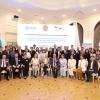Search
Displaying Results 76 - 100 of 117
Six months after UNECE ministers from 44 countries renewed their commitments on a number of environmental issues in the region (Batumi, Georgia, 8-10 June 2016), delegates at the 22nd session of the UNECE Committee on Environmental Policy (CEP) discussed progress in the implementation of those
The Government of Kyrgyzstan has stressed the necessity to enhance its national innovation system as one of the priorities of its National Sustainable Development Strategy for the period 2013-2017. The strategy has highlighted the need to strengthen linkages between, on the one hand, the
UNECE has been actively engaged in the preparations of the World Conference on Disaster Risk Reduction (Sendai, 14-18 March). At the conference, UNECE Executive Secretary Christian Friis Bach will showcase at various sessions how UNECE work helps member States reduce disasters risks, build
Infrastructure projects are crucial for sustainable development, impacting not just economies but also communities and the environment. The tangible benefits they bring to people's lives can have a transformative effect and contribute to achieving the Sustainable Development Goals (SDGs). However,
A recent UNECE study on mapping of energy efficiency standards in buildings has shown that there is still much room for improvement in the setting and application of such standards in the countries of the UNECE region. In many countries there are challenges both with strictness and with
In Central Asia, the silk routes, the caravans of merchants made it possible for East and West to exchange culture, customs and goods - spices, silk, perfumes and food - and thus determined life and livelihoods for centuries… And, so have nuts and dried fruit traded on the silk routes and part
In her opening remarks at the 8th edition of the UNECE International PPP Forum, UNECE Executive Secretary Tatiana Molcean emphasized the urgency of accelerating the implementation of the SDGs and climate action through sustainable Public-Private Partnerships (PPPs) and infrastructure finance.
In recent years, the participating States of the United Nations Special Programme for the Economies of Central Asia (SPECA) - Afghanistan, Azerbaijan, Kazakhstan, Kyrgyzstan, Tajikistan, Turkmenistan, and Uzbekistan - have observed rapid growth in the number and impact of business incubators and
Strong cooperation between the World Bank and UNECE, which services the Convention on the Protection and Use of Transboundary Watercourses and international Lakes (Water Convention), can bring many benefits: the Convention can increase the sustainability of regional and basin cooperation
Creating favourable regulatory frameworks and incentives for renewable energy development, diversifying energy supplies, tackling greenhouse gas emissions from the energy sector and ensuring the safety of oil and gas pipelines are just some of the energy-related issues addressed in UNECE
Much progress has been made since the 1990s in the countries of Eastern Europe, the Caucasus and Central Asia (EECCA - Armenia, Azerbaijan, Belarus, Georgia, Moldova, Kazakhstan, the Kyrgyz Republic, Tajikistan, Turkmenistan, Ukraine and Uzbekistan) to address severe environmental problems while
Responding to the request of the Governing Council of the United Nations Special Programme for the Economies of Central Asia (SPECA), UNECE is building the capacity of public and private experts in the SPECA participating States to use the semantic standards and reference data models of the UN
SPECA countries are facing unique challenges, stemming from at least three crises: the need to deal with the regional and global repercussions of the COVID-19 pandemic, the political upheaval in Afghanistan, and the conflict in Ukraine. With the correct policies and mechanisms for subregional
During the last four years, UNECE together with UNDP and partner aid agencies, have worked with the public and the private sectors in Central Asia to improve their capacity to sell products in the UNECE region and beyond. The focus has been Central Asia’s largest production region, an area
The challenges posed by climate change to Central Asia, the likelihood of more frequent compound water-energy-food crises and the growing strain on the shared water resources of the region due to economic development and demographic growth require more intensive joint efforts by the countries of
As countries seek to rapidly decarbonize their economies, investing in energy efficiency and the improved performance of buildings offers significant near term gains. Available measures can help transform the building and construction sector, which today is responsible for approximately 40% of
Joint efforts to harmonize data collection, strengthen monitoring and data exchange on water quality, develop early warning systems on water pollution at transboundary waters and improve collection and sharing of data on transboundary aquifers are needed for effective regional cooperation in
The COVID-19 pandemic, the subsequent economic downturn, and the far-reaching negative effects of the war in Ukraine, have created additional development challenges for Central Asian economies. This includes the countries of the UN Special Programme for the Economies of Central Asia (SPECA),
Four thousand kilometers away from the UNECE headquarters in Geneva used to lie the Aral Sea. It was the fourth biggest lake in the world, in fact the lake was bigger than Switzerland. But if we travelled there today, we would only find a desert as the lake has dried out. The Caucasus and
Cultivation of genetically modified seeds is on the rise worldwide and there has been diversification in terms of the types of genetically modified organisms (GMOs) grown in addition to the initial three (maize, soybean and cotton). In 2017, nearly 190 million hectares of GMO crops were grown in
UNECE and partners have started implementation of a multi-year project on “Improving the energy efficiency of the global building supply chain industry and its products to deliver high performance buildings” (full project budget EUR 19.8 million), funded by the International Climate Initiative (IKI
Central Asian countries are actively working towards improving access to water and sanitation. Despite recent progress, Kazakhstan's aging infrastructure, lack of human resources and financial constraints still limit the access of rural population to improved water and sanitation services. In 2022
Countries of Central Asia, the Caucasus and Eastern Europe have been hit hard by the socioeconomic impacts of the COVID-19 pandemic, which threatens to derail sustainable development progress in the region.
However, there is also a stronger momentum towards regional cooperation, and countries can
The countries of the UN Special Programme for the Economies of Central Asia (SPECA) - Afghanistan, Azerbaijan, Kazakhstan, Kyrgyzstan, Tajikistan, Turkmenistan and Uzbekistan - gathered for a virtual session of the SPECA Working Group on Innovation and Technology for Sustainable Development (WG on
Forest tree nuts and dried fruits can contribute to the sustainable use of natural resources as well as livelihoods of producers, supporting cross-cutting progress towards the Sustainable Development Goals (SDGs). More than 1.6 billion people, mostly in developing countries, depend on forests












